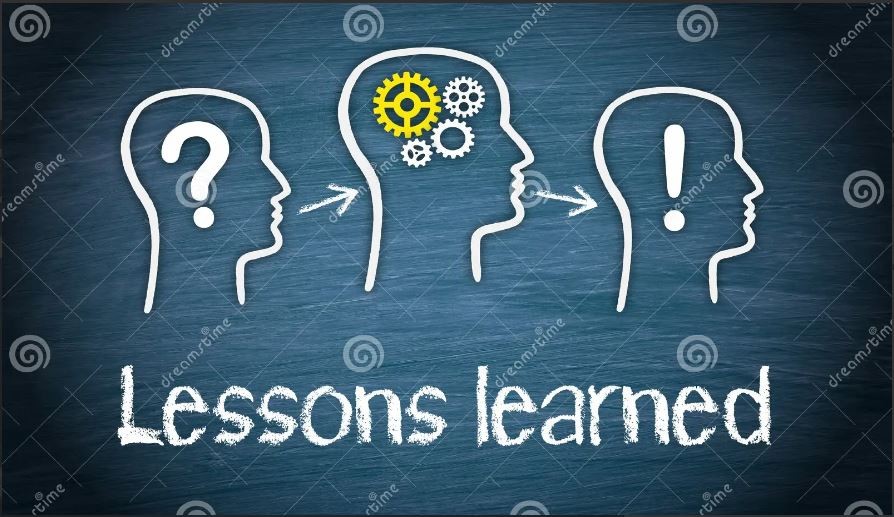Critical Insights From Project Management Lessons Learned
When you’re knee-deep in a project, it’s easy to focus solely on the task at hand. But, it’s just as crucial to take a step back and reflect on the lessons learned. Every project you undertake is a learning opportunity ripe with insights and experiences that can enhance your skills and knowledge as a project manager.
The beauty of lessons learned? They serve multiple purposes. Not only can they help you identify and dodge past mistakes, but they can also optimize your project execution. By analyzing what worked and what didn’t, you’re paving the way for continuous improvement in your future projects. So, let’s dive into the world of project management lessons learned, and discover how they can make you a more effective and efficient project manager.
What Are the Lessons Learned in Project Management?

As a project manager, you understand that every project represents an opportunity to learn. These project management lessons learned, or insights and experiences gained throughout the project lifecycle, are gems that shape your future strategies. Let’s delve deeper into the world of lessons learned.
What Is the Purpose of Lessons Learned?
By nature, project management experiences involve a fair share of successes and failures. Each of these outcomes carries its own set of lessons. Efficiency in project management involves your ability to dissect these successes and failures, understand their roots and pick out the lessons.
The process of capturing, documenting, and applying lessons learned serves various crucial purposes:
- Enhancing Skills: As a project manager, your competence grows with each project. By reflecting on your experiences and identifying areas for development, your skills continually evolve. The lessons you learn are a guide, helping you navigate your way towards a more refined set of skills and knowledge.
- Avoiding Mistakes: By documenting your mistakes in past projects, you effectively compile a playbook of what not to do. This knowledge empowers you to avoid repeating them in future projects, reducing risks and elevating your project outcomes.
- Optimizing Project Execution: Reviewing your project learnings offers an avenue to identify areas of improvement in project execution. You can pinpoint processes, tools, or techniques that were effective and those that weren’t. This insight is helpful in the continuous improvement of your management strategies, making your approach more streamlined and effective.
What Is a Lessons Learned Document?

A Lessons Learned Document is an imperative component of project management. It serves as a repository of insights and understandings attained during the course of the project. This document contains a record of the project’s successes and setbacks, providing valuable information to guide future tasks.
How to Document Lessons Learned?
Creating a Lessons Learned Document is a two-step process that involves recognizing and documenting.
Recognizing:
The first step in lessons learned in project management, recognition, is essentially the extraction of knowledge. This process involves all relevant project stakeholders and encourages them to share their insights. The objective here isn’t just to highlight what went well; it’s also to acknowledge where there were problems and understand how they can be improved upon. These suggestions gathered are not only beneficial for future projects but also enhance the project management lessons learned.
Documenting:
Once these lessons are recognized, the second step is to document them. It’s important to note that the documentation of lessons should be constant throughout the project lifecycle. It’s a dynamic process, and team members should not wait for a specific time to record the lesson. Instead, they should do so as soon as they learn it. This proactive approach to documenting not only keeps the document up-to-date but also reduces the chances of forgetting vital information.
What Are Examples of Lessons Learned in a Project?
Project management lessons often come from glowing accomplishments and confounding challenges. Let’s delve into some real-life scenarios that will give you a clearer understanding of how a lessons-learned approach can modify and refine your project execution strategies. Perhaps a marketing project overspending its budget resulted in extraordinary, impactful results. The takeaways?
- Sometimes, thinking outside the budget box is beneficial, but
- Always report to stakeholders about an impending budgetary leap.
Regardless of the type of project, there will always be worthwhile project management lessons learned. Workflow efficiency might be impacted by procedural complexities in one project. In another, the lack of a project charter led to scope creep and the team’s inability to meet the client’s expectations.
Why Are Lessons Learned Important in Project Management?

When it comes to project management lessons learned, there’s a pivotal role they play in driving continual improvement. These experiences, both good and bad, serve as valuable guides for future projects – ensuring you don’t fall into the same pitfalls again. Through lessons learned in project management,
- Improve decision-making, reduce project risks.
- Increase the chances of project success.
- Having a lessons log allows you to track experiences as the project progresses.
- This log can include identifiers, project info, dates the lessons were captured, and who raised the lesson.
- It can also reflect the severity of the issue – ranging from “1” for a showstopper to “5” for negligible.
- This grading helps prioritize which lessons need immediate attention and which can be tackled later.
What are the Challenges Involved in Lessons Learned in Project Management?
Another aspect is understanding how to use tools to manage your lessons learned project management processes. Platforms such as Atlas offer an avenue for PMO to create and maintain their own project workspaces. This includes lesson log templates and the ability to view past lessons, promoting continuous learning and knowledge sharing within your team.
However, capturing lessons learned isn’t without its challenges. It’s recognizing these obstacles that helps pave the way toward effective project management:
- Limited Time and Resources: Often, project managers juggle several tasks at once – so finding time to capture and document lessons can be difficult. Lack of resources might also hinder comprehensive analysis.
- Lack of Documentation: If project teams fail to document key project aspects, significant insights could be lost, making it harder to gain from those lessons.
- Resistance to Change: Accepting feedback and instigating change need an openness within the team. Resistance, either due to personal attitudes or organizational culture, can pose challenges.
- Ineffective Communication: Without clear, concise communication, crucial details can get lost, leading to misunderstandings and potential project failures.
In the flux of various challenges, understanding these common hurdles helps to devise solutions. Such understanding also maximizes the benefits of the project management lessons you learned. The next step is exploring practical ways to capture and apply these lessons to optimize the project lifecycle further.
Benefits of Lessons Learned in Project Management

Delving into the realm of project management lessons learned is a practice that can yield numerous benefits. Let’s explore how implementing these can add value and drive positive changes in your organization.
1. Streamlining Project Workflows
A critical advantage of incorporating lessons learned in project management is in streamlining project workflows. When you identify areas of success and improvement, you can adjust your project management strategies accordingly. This adjustment increases efficiency, helping your team deliver better results at a swifter pace.
2. Sharing Knowledge Across Projects
By documenting lessons and sharing these experiences, your insights become beneficial for the broader team. These shared lessons can help your colleagues in avoiding potential pitfalls or leveraging best practices. This practice fosters collaboration, promotes innovation, and enables continuous improvement across other projects as well.
3. Ensuring Project Success
Applying the learnings from project management lessons learned prepares you with a strategic edge to handle challenges and avoid risks. This now-informed decision-making tool, helps adapt project plans in real-time and guides towards more effective strategies. This practice increases the likelihood of project success and improves client satisfaction.
4. Driving Professional Growth
Lastly, the learning from your projects isn’t just valuable for the project at hand; it’s indispensable for your professional growth as a project manager. In reflecting on your experiences, you can identify areas for personal development, acquire new skills, and enhance your competency as a professional.
How to Host a Lessons Learned Meeting?
Hosting a lessons learned meeting proficiently is crucial in project management lessons learned. Not only does it give space to recognize what went well, but it also helps identify what didn’t go as planned. You should also assess the anticipated project events to see if they occurred as expected.
1. Involve Everyone
Start by ensuring everyone involved in the project is included. Diverse perspectives enhance the richness of the discussions. Encourage participants to share their experiences without fear of criticism. Remember, even the most respected project managers face criticism.
2. Encourage Both Positive & Negative Aspects
Next, focus on both the positive and negative aspects. Reflect on the successes first. This approach enlists confidence and opens the way for admitting mistakes. Examine areas where you met or didn’t meet project milestones.
In case of missed milestones, dissect what went wrong. Lack of willingness to introspect is a step towards project failure. Therefore, it’s key to be open to analyzing project aspects where failure occurred.
3. Look For Ineffective Communicatiion
Once the discussion is open, watch for signs of ineffective communication. It’s a primary issue in many project settings. For instance, if marketing materials did not accurately represent the brand’s values due to a communication gap, consider implementing regular cross-functional meetings.
The purpose of the lessons learned in project management meeting is not to assign blame, but to learn and grow from each project’s successes and failures. By focusing on improvement, you can increase efficiency, innovate, and enhance project outcomes, driving professional growth.
4. Organize Results
Lastly, ensure that you store and organize results from the meeting for future reference. This data can benefit current and future projects, serving as a foundation for continuous improvement.
How to Apply Lessons Learned?

Now that you’ve organized your lessons learned meeting and come out with valuable insights, it’s time you look at how to implement those lessons. After all, lessons learned in project management should not be merely captured and stored away. They ought to influence your future decisions, strategies, and projects, ultimately the process’s most critical part. In order to effectively apply lessons learned in your project management, several key steps must be considered.
1. Create The Lessons Learned Report
Creating a lessons learned report is one of the most crucial steps in applying lessons learned. This report isn’t just a rundown of what went wrong and what went right. It’s a systematic overview of the project management lessons learned, emphasizing how these learnings can be implemented moving forward.
Lessons learned reports should include the following:
- Description of the lesson
- How it occurred
- Recommendations for future projects
2. Leveraging Lessons for Future Projects
After you have compiled a comprehensive lessons learned report, the next move is to leverage these learnings to enhance future projects. This involves several elements, including:
- Incorporating lessons into your project planning stages
- Communicating your learnings across teams
- Revise and improve workflows or processes based on lessons learned
3. Continuous Learning and Improvement
The application of lessons learned is a never-ending journey. Just as you strive to learn from past projects, you should also strive to apply those lessons to improve future outcomes continuously.
A proactive and ingrained culture of learning can greatly impact a company’s ability to grow and adapt. Remember, the premise of lessons learned hinges on the idea that learning from history can lead to greater success in the future. So, keep these learnings at the forefront of your project management endeavors, continually breathing life into the heart of your projects.
Conclusion
The power of lessons learned in project management. It’s not just about jotting down notes post-project but also about making those lessons work for you in the future. By creating a detailed report, you’re setting the stage for success in upcoming projects. Sharing this knowledge across teams and refining your workflows based on these insights can lead to significant improvements. Remember, it’s all about fostering a culture of continual learning and growth. So, take those lessons learned and let them guide you towards a more efficient, effective future in project management.
Frequently Asked Questions
Q1. What are the key takeaways from the project?
From the project, key learnings include the importance of trying new things, working collaboratively in a team setup, and taking care of the environment. The ability to listen and understand team dynamics is also crucial for a successful project outcome.
Q2. Why is expertise in project management crucial?
Project management expertise aids in delivering projects successfully. It ensures projects are completed within set parameters such as time, budget, and quality. It also assists in risk management, effective resource utilization, and stakeholder communication.
Q3. What characterizes effective lessons learned?
Effective lessons learned can be gleaned from both positive and negative experiences during the project. In some cases, the process of collectively gathering these lessons can be equally or more valuable than the lessons themselves.
Q4. What is the importance of ‘lessons learned’ in project management?
The primary purpose of ‘lessons learned’ is offering future project teams valuable insights that can enhance effectiveness and efficiency. Lessons learned form a knowledge base, built on the experience earned by each completed project.
Q5. How can one record ‘lessons learned’ in project management?
The process of recording ‘lessons learned’ involves identifying and documenting the lessons. Subsequently, conducting a thorough analysis of these lessons to garner insights and recommendations for future project undertakings.

Leave a Reply